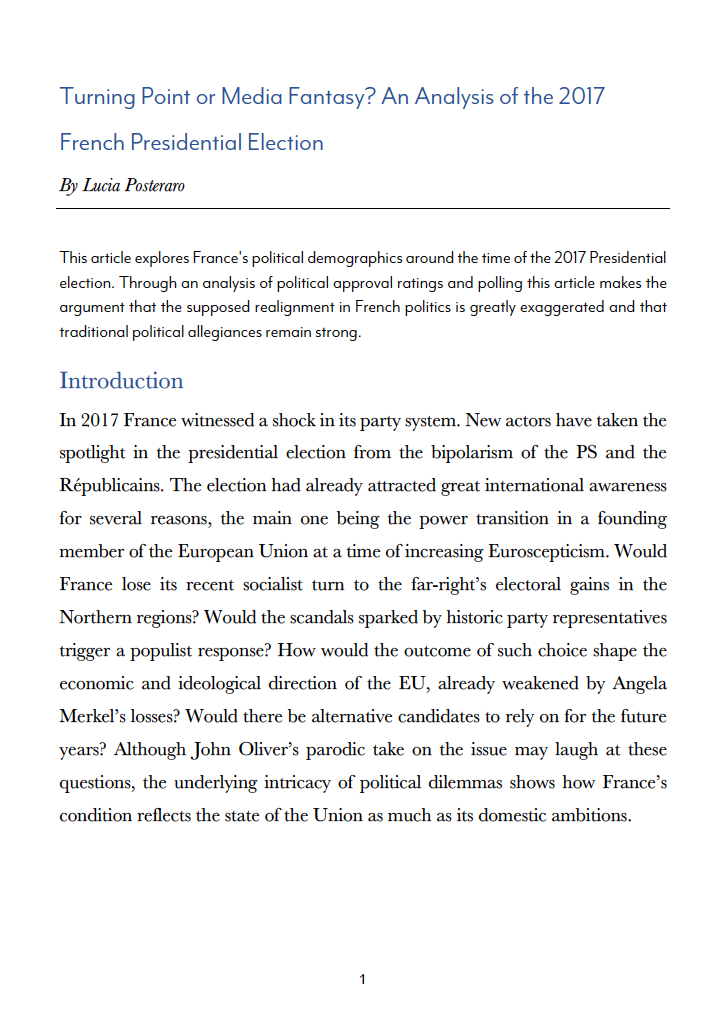Turning Point or Media Fantasy?
An Analysis of the 2017 French Presidential Election
DOI:
https://doi.org/10.36399/GroundingsUG.12.157Keywords:
French Politics, 2017 Election, Demography, PollingAbstract
This article explores France's political demographics around the time of the 2017 Presidential election. Through an analysis of political approval ratings and polling this article makes the argument that the supposed realignment in French politics is greatly exaggerated and that traditional political allegiances remain strong.
References
Bartels, Larry M. 2010. “ The Study of Electoral Behaviour” in The Oxford Handbook of American Elections and Political Behavior. Edited by Jan E. Leighley 239-261. Oxford: Oxford University Press.
Campbell, Angus., Converse, Phillip., Miller, Warren., and Stokes, Donald., 1960. The American Voter. Chicago: University of Chicago Press.
Cautrès, Bruno., 2017.“ Mélenchon, ‘vainqueur caché’ de la présidentielle?“ in Le Vote Disruptif: Les Elections Présidentielle et Législatives de 2017. Edited by Pascal Perrineau 175-192. Paris: Sciences Po Les Presses.
Cautrès, Bruno., 2017. “La Campagne Electorale” in La France d’Emmanuel Macron. Edited by Ricardio Brizzi and Mark Lazar., Chapter 3. Rennes: Presses Universitaires de Rennes.
Cautrès, Bruno., Lazar, Marc., Pech, Thierry., and Vitiello, Thomas, 2017. in La République En Marche: Anatomie d’un Mouvement. Terra Nova Publications. Available at http://tnova.fr/system/contents/files/000/001/631/original/Rapport_Terra-Nova_La-REM-Anatomie-d-un-mouvement_081018.pdf?1539165766.
Dalton, Russell J., 2016, Citizen Politics: Public Opinion and Political Parties in Advanced Industrial Democracies, 6th edition. New York: SAGE.
Europe 1, April 21st 2016, “Finalement, le parti d'Emmanuel Macron est ‘et de droite, et de gauche (mais surtout progressiste)”. News article accessed on 13/11/2018. Available at https://lelab.europe1.fr/emmanuel-macron-refuse-detre-loblige-de-francois-hollande-2726290.
Fourquet, Jerome., 2017, “Radiographie des Votes Ouvriers”. Fondation Jean Jaurès. Accessed 13/11/2018. https://jean-jaures.org/nos-productions/radiographie-des-votes-ouvriers.
Gougou, Florent., 2017. “Les ouvriers et le Vote Front National: Les Logiques d’un Réalignement électoral” In Les Faux-Semblants du Front National: Sociologie d’un Parti Politique. Edited by Sylvain Crepon, Alexandre Deze and Nonna Mayer, 323-344. Paris: Sciences Po Les Presses.
Grunberg, Gerard. 2017. “Le sombre avenir de la gauche”. Le Vote Disruptif: Les Elections Présidentielle et Législatives de 2017. Edited by Pascal Perrineau, 307-318. Paris: Sciences Po Les Presses.
Ignazi, Piero., 2017. “Emmanuel Macron entre Jupiter et Minerve”. In La France d’Emmanuel Macron. Edited by Brizzi, Ricardio and Lazar, Marc, 195-216. Rennes: Presses Universitaires de Rennes.
Inglehart, Ronald., 2003. “How Solid is Mass Support for Democracy – and How Can We Measure It?”. PS: Political Science and Politics, Vol. 36, No. 1. pp. 51-57.
Inglehart, Ronald. and Klinghemann, Hans D., 1976. “Party Identification, Ideological Preference and the Left-Right Dimension Across Western Mass Publics”. In Party Identification and Beyond: Representations of Voting and Party Competition. Edited by Ian Budge, Ivor Crewe and Dennis Farlie. New York: J. Wiley and Sons.
Inglehart, Ronald. and Welzel, Christian, 2005. Modernization, Cultural Change, and Democracy: The Human Development Sequence. Cambridge: Cambridge University Press.
Institut Français d’Opinion Publique (2018), Les Indices de Popularité: Octobre 2018. Available at https://www.ifop.com/wp-content/uploads/2018/10/Indices-de-popularit%C3%A9-Octobre-2018.pdf.
Ipsos Mori (2017), 2017 Election Présidentielle, 2nd Tour: Sociologie des Électorats et Profil des Abstentionnistes. Available at https://www.ipsos.com/sites/default/files/files-fr-fr/doc_associe/ipsos_sopra_steria_sociologie_des_electorats_7_mai_20h15_0.pdf.
König, Pascal D. and Waldvogel, Thomas., 2018.“Ni gauche ni droite? Positioning the candidates in the 2017 French presidential election”. French Politics, online paper.. pp. 1-23.
Le Monde,“Présidentielle: la désagrégation du vote de gauche se poursuit”. 16th February, 2016. News article accessed on 13/11/2018. Available at https://www.lemonde.fr/election-presidentielle-2017/article/2017/02/16/presidentielle-le-vote-de-classe-de-plus-en-plus-eclate_5080595_4854003.html.
Lipset, Seymour. and Rokkan, Stein. 1967. “Cleavage Structures, Party Systems, and Voter Alignments: An Introduction”. Party Systems and Voter Alignments: Cross National Perspectives. Edited by Seymour Lipset & Stein Rokkan. London & New York: The Free Press.
Martigny, V., 2017. “A gauche, la fin de la synthèse social-démocrate”. In Le Vote Disruptif: Les Elections Présidentielle et Législatives de 2017. Edited by Pascal Perrineau. Paris: Sciences Po Les Presses.
Mayer, Nonna., 2002. Ces Français qui Votent Le Pen. Paris: Flammarion.
Mayer, Nonna., 2014. “The Electoral Impact of the Crisis on the French ‘Working Class’: More to the Right?”., In Mass Politics in Tough Times: Opinions, Votes, and Protests in the Great Recession. Edited by Nancy Bermeo and Larry M. Bartels. Oxford: Oxford University Press.
Muxel, Anne., 2017. “La mobilisation électorale, du décrochage civique à l’abstention record”. In Le Vote Disruptif: Les Elections Présidentielle et Législatives de 2017., Edited by Pascal Perrineau. Paris: Sciences Po Les Presses.
Pech, Thierry., 2017. “Le modèle économique et social”. In La France d’Emmanuel Macron. Edited by Ricardio Brizzi and Marc Lazar. Rennes: Presses Universitaires de Rennes.
Perrineau, Pascal., Cette France de Gauche qui vote FN. Paris: Seuil, 2017.
Rouban, Luc., 2018. Les Paradoxes du Macronisme. Paris: Sciences Po Les Presses.
Strudel, Sylvie., 2017. “ Emmanuel Macron :un oximore politique?”. In Le Vote Disruptif: Les Elections Présidentielle et Législatives de 2017. Edited by Pascal Perrineau. Paris: Sciences Po Les Presses.
Tiberj, V. (2017), “Running to stand still. Le clivage gauche/droite en 2017”. Revue française de science politique, Vol. 67, no. 6, pp. 1089-1112.

Downloads
Published
Issue
Section
License
Copyright (c) 2019 Lucia Posteraro

This work is licensed under a Creative Commons Attribution 4.0 International License.
The CC BY 4.0 license is a Creative Commons license. This is a non-copyleft free license that is good for art and entertainment works, and educational works. It is compatible with all versions of the GNU GPL; however, like all CC licenses, it should not be used on software. People are free to: Share — copy and redistribute the material in any medium or format; Adapt — remix, transform, and build upon the material for any purpose, even commercially. The licensor cannot revoke these freedoms as long as you follow the license terms. But they must conform to the following terms: Attribution — You must give appropriate credit, provide a link to the license, and indicate if changes were made. You may do so in any reasonable manner, but not in any way that suggests the licensor endorses you or your use. No additional restrictions — You may not apply legal terms or technological measures that legally restrict others from doing anything the license permits.
Please check individual article PDF copies to see if any additional restrictions apply.







